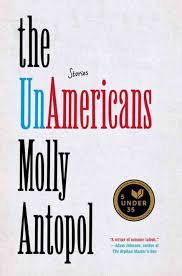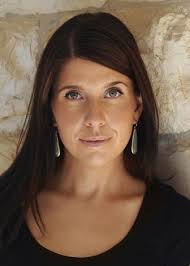From My Bookshelf: Molly Antopol’s “The UnAmericans” (and an Interview with the Author)
 Earlier this year, I published an article listing five “Jewish books” scheduled for publication in 2014 that I was already especially eager to read. Molly Antopol‘s The UnAmericans was one of those titles. As I wrote at the time: “I’m not the only one with high expectations for this debut collection of short stories. Anointed by the National Book Foundation as one of its ‘5 Under 35’ honorees, Antopol and her book (which W.W. Norton will release in February) have received plenty of pre-publication buzz. “My stories move from McCarthy-era Los Angeles to modern-day Jerusalem to communist Prague,” Antopol has said in an interview, adding that many of the stories were inspired by her family history.
Earlier this year, I published an article listing five “Jewish books” scheduled for publication in 2014 that I was already especially eager to read. Molly Antopol‘s The UnAmericans was one of those titles. As I wrote at the time: “I’m not the only one with high expectations for this debut collection of short stories. Anointed by the National Book Foundation as one of its ‘5 Under 35’ honorees, Antopol and her book (which W.W. Norton will release in February) have received plenty of pre-publication buzz. “My stories move from McCarthy-era Los Angeles to modern-day Jerusalem to communist Prague,” Antopol has said in an interview, adding that many of the stories were inspired by her family history.
Well, I purchased a copy for my Kindle and began reading. And I was just as impressed as I expected to be. Molly and I connected online, and I asked her if she’d be willing to answer a few questions for My Machberet.
I suggested that we follow the format used in another interview, in which Molly focused on just one of her stories. Below, you’ll see our “conversation” about the story in her collection that is titled “The Unknown Soldier.” As Molly herself explains, this is a story “about a young, out-of-work actor who plays up his communist leanings to win the favor of an openly leftist film”–with some very sad and serious consequences.
Molly Antopol teaches creative writing at Stanford University, where she was a recent Wallace Stegner Fellow. Her collection The UnAmericans was indeed published W.W. Norton this February (and in six other countries). The book is a Barnes and Noble Discover Great New Writers selection, and an Indies Introduce Debut Authors and Indie Next pick. Antopol received her M.F.A. from Columbia University, and her writing has appeared or is forthcoming on NPR’s This American Life, online at The New Yorker, and in The New York Times, The Wall Street Journal, The San Francisco Chronicle, One Story, Oxford American, Ecotone, Glimmer Train, American Short Fiction, Mississippi Review Prize Stories, The Rumpus, The Scotsman, Southern Humanities Review and elsewhere. She is also a writer-in-residence at the Summer Literary Seminars in Lithuania. She lives in San Francisco, and is at work on a novel, The After Party, which will also be published by Norton.
Please welcome Molly Antopol.
ERIKA DREIFUS (ED): Molly, where did the idea for “The Unknown Soldier” come from?
MOLLY ANTOPOL (MA): With the earliest stories in my book, I was interested in exploring what it might have been for my mother to grow up in a communist home—and what that level of surveillance was like for her both psychologically and emotionally. One thing my mother often talked about was how hard it was on my grandfather, a truck driver and union organizer, that so many people assumed Jewish communists in L.A. had money and were in the Hollywood industry, when in reality he felt so far from—and ignored by—that world. As I worked on my collection, it became important to me to explore the distinction between the working-class Jewish communists in L.A. (as in my story “Duck and Cover”) and the wealthier Hollywood liberals, like the Hollywood Ten (as in “The Unknown Soldier”). In “The Unknown Soldier,” which is about a young, out-of-work actor who plays up his communist leanings to win the favor of an openly leftist film director, I kept thinking about what it might be like for a person to be so driven by ambition that he’d lie about his own history, his own beliefs—only to be blacklisted and jailed for those fabricated politics.
ED: One subtle strand in this story concerns intermarriage in the U.S. at a time when such marriages were less common than they are today. We discover that the non-Jewish wife, Katherine, told her future husband upon meeting him that “he was the third Jew she’d ever talked to,” and that Alexi “had found something sexy, even thrilling, in that admission, moving her hands jokingly through his hair to prove he didn’t have horns.” After they marry, Alexi has an affair with a Jewish woman, Julia, whom he finds “so easy to be around. Another Jewish transplant from the outer boroughs, another person who vacillated between the highs and lows of fame and failure with athletic, almost Olympic speed. Another person whose ambition was fueled by the same paranoia that whatever success she’d achieved could be rescinded at any moment….” Please tell us a bit about what fueled this intriguing sub-theme in the story.
MA: That was a theme I only realized existed in the story once I’d worked through a couple drafts and finally had a grasp on Alexi’s character. One of the things I find so heartbreaking about him is how uncomfortable he is in his own skin, and how he’s only at peace with himself when he’s playing a role. I was interested in exploring why it was so thrilling for him to marry Katherine, a person so different from him in every way—especially when he finds the ultimate comfort with Julia, his mistress with whom he shares a similar background, though in the end it’s she who ultimately betrays him by naming names.
ED: As is true across the stories in your collection, “The Unknown Soldier” is suffused with history. There’s big-picture History, to be sure: wars, social movements. But again, there’s richness in the details. This story, for instance, includes multiple references to prices and costs. For a 2014 reader in the U.S., the prices are quite low; for Alexi and his son decades earlier, however, they are—dramatically—too high. Especially for other writer/researchers out there—how did you determine plausible costs or prices for the story’s era and place?
MA: The only way I know how to write a story is to do every bit of research I can, then spend months trying to shuck away at least half of it until the effort no longer shows and I’m able to see how all of that history informs my characters. That’s the moment I begin to see the story’s true shape. As with my other McCarthy-era stories, I sought a lot of details and information from my family, and with this story in particular I also did a lot of historical and film archival research in Los Angeles. I also read as much as I could on the Hollywood Blacklist—two books I found particularly helpful were Larry Ceplair and Steven Englund’s The Inquisition in Hollywood and Victor Navasky’s Naming Names. And in terms of your question about money, I called historic hotels and wineries, a few California historical foundations and then fact-checked everything with my grandfather. I love that when I approach him with seemingly random questions like how much a motel room would cost in the early 1950s, he doesn’t even blink—I think at this point, he’s used to my strange questions!
ED: A proud grandfather, I’m sure! How long did it take you to write this story, and what was the most challenging aspect of writing it?
MA: I wrote the first draft in two feverish months, then tweaked and revised for about ten more. The hardest part was making the present-day action of Alexi’s road trip with his son as compelling as the inherently more thrilling and sweeping backstory of his heyday in Hollywood and subsequent arrest.
ED: Well, you succeeded. The road trip is at least as powerful as the backstory. Now, I know that you’ve addressed this next (final) question to some extent elsewhere but I’m wondering how you consider The UnAmericans to be a “Jewish book.”

MA: Over the years, I’ve heard a number of people remark that Jews have become so assimilated that “Jewish fiction” should no longer exist as a separate category. Or that Jewish fiction is so mainstream as to render that term meaningless. That’s fascinating to me. In some ways I agree with it—the neighborhoods of Malamud’s Brooklyn, Ozick’s Manhattan and Bellow’s Chicago are certainly no longer filled with Yiddish-speaking immigrants. And the work of Philip Roth, for example, is undeniably as American as it is Jewish. But what to make, then, of all the incredible fiction by young Russian-American Jews that seems so bent on understanding their relatives’ lives under the Soviet State, in addition to their own here in America? Or all of the Israeli fiction that, more and more each year, is being translated into English? And so many of my favorite contemporary Jewish writers—Edith Pearlman, David Bezmozgis, David Grossman, to list a few—seem as interested in the past as they are in the present. To me, the past feels inescapable. Issues of immigration, emigration and identity are central to the Jewish experience of the 20th century, and I explore those throughout the book.
ED: Thank you so much, Molly, for taking the time to answer these questions. And congratulations again on a marvelous book.
Some other recommended reading: Molly’s story “My Grandmother Tells Me This Story,” which also appears in the book, and Sandee Brawarsky’s profile of Molly for The Jewish Week.
